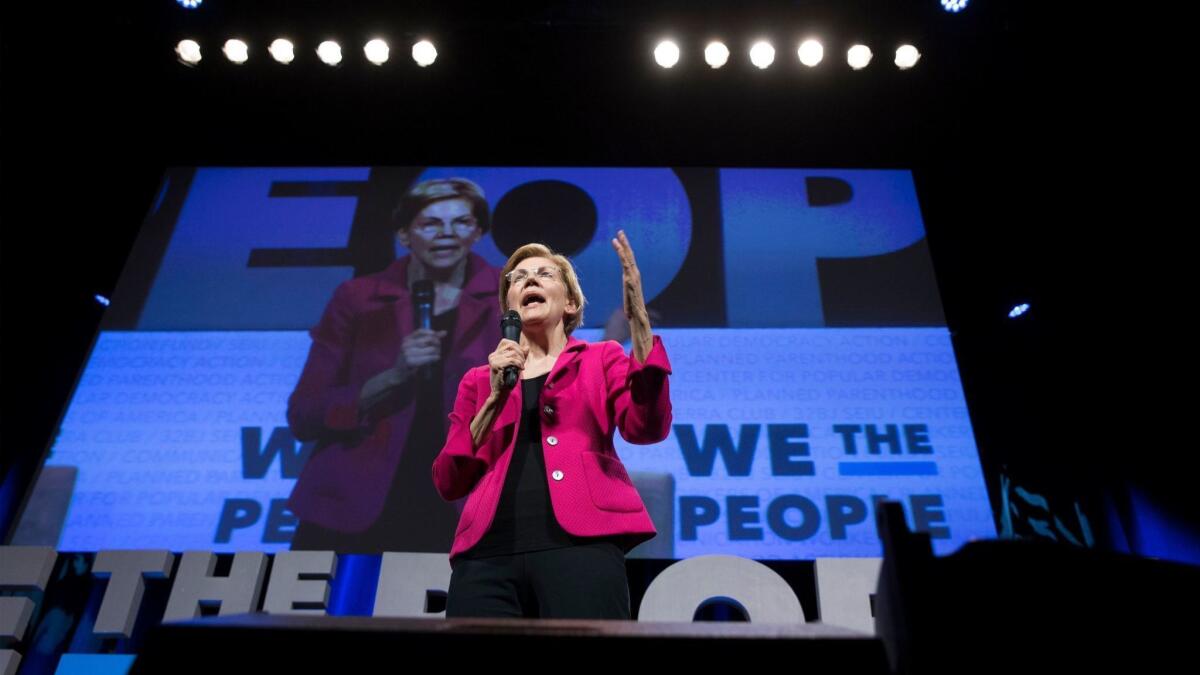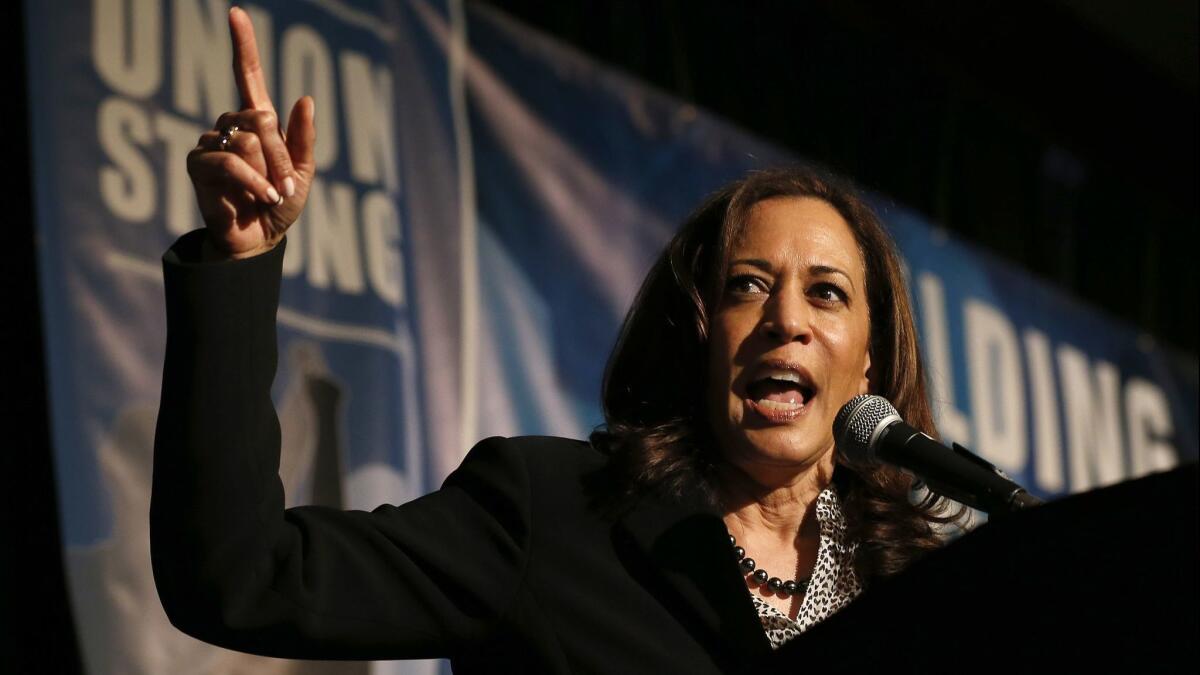Labor unions wade into 2020 race with caution after being burned in 2016

- Share via
Reporting from Washington — As Democratic presidential candidates compete for coveted labor union endorsements that can bring an infusion of campaign resources and manpower, they are not the only ones on edge.
Labor leaders are also anxious — eager not to renew the discontent that rippled through their memberships four years ago when unions started jumping into the Democratic primary.
An effort designed in the last election to galvanize the membership and make a show of force, instead became divisive in several big unions whose leaderships backed Hillary Clinton over the more aggressively pro-union insurgent, Sen. Bernie Sanders.
“Some of the unions will probably be changing their mind this time and going about it a whole different way, because quite frankly, it backfired on them,” said Christopher Shelton, president of the Communication Workers of America, which avoided the internal tension last time by having its full membership choose whom to endorse. The union backed Sanders.
The efforts to make the rank and file feel more invested were on full display in Washington Monday, as the Communications Workers and another of the country’s largest unions, the Service Employees International Union, partnered with progressive groups at a town hall event.
By the time eight Democratic candidates had individually taken the stage and been drilled with questions from workers packing downtown Washington’s Warner Theater, labor leaders had already been maneuvering in the background to restore unity.
The American Federation of Teachers announced late last month it was changing its endorsement process to seek more input from front line educators. The union’s early backing of Clinton last time led to a significant membership revolt.
“We must have a process that our members believe in, that is credible, authentic and transparent,” AFT president Randi Weingarten said while unveiling the new plan on a March 19 tele-town hall with 30,000 members.
Also changing things up is SEIU. Its membership fractured during the last election when the New Hampshire chapter, the largest union in that state, refused to embrace the national organization’s Clinton endorsement.
Under SEIU bylaws dating back a quarter century, New Hampshire’s state chapter is the only one empowered to make its own endorsement. It used that authority to back Sanders, who won the state in a landslide.
“This time, we want to figure out how do we give as much air and oxygen and space as we possibly can for our members to be at the center of this decision,” said Mary Kay Henry, president of the union.
“We have to figure out a 21st century way to engage as many of our members who want to participate.”
As for the New Hampshire chapter, she said, “I’ve been working hard on reeling them in and helping them understand that together we have more power. I hope they will stay with us on this journey.”
More stories from Evan Halper »
The overall journey may be less complicated this time around. So many candidates are vying for the nomination that some labor leaders doubt there will be any primary endorsements at all.
Even the leader of the communications workers, which gave Sanders one of his most potent primary endorsements in 2016, was predicting shortly before the candidate took the stage Monday that there won’t be a repeat.
“There are just too many people running,” Shelton said. “We will probably just wait until the primaries are over … I think a lot of unions are going to stay out of the primaries.”
But the prospect that endorsements could still happen – and the eagerness to impress the rank and file – propelled all the candidates who took the stage Monday to offer an ambitious labor agenda.
“This is about writing rules of the game that favor labor again,” New Jersey Sen. Cory Booker said, in response to tough questioning from a CWA official who pointedly challenged him on his history of taking campaign cash from Wall Street interests.
Former Housing and Urban Development Secretary Julian Castro noted that on a recent campaign swing to Stanford, he made sure to hear the labor concerns of the maintenance staff. He also noted that everyone in his campaign — including interns — gets paid at least $15 an hour.
Former Texas congressman Beto O’Rourke bemoaned the damage done to labor and society, he said, by the Supreme Court decision that scaled back who must pay union dues.
Minnesota Sen. Amy Klobuchar, who like O’Rourke and Booker, has a more moderate voting record than some in Monday’s audience may have preferred, vowed she would curb corporate power by bringing more scrutiny to corporate mergers.
“Our laws are not as sophisticated as the [corporate] titans making these deals,” she said.
But the biggest applause — and standing ovations — were reserved for Sanders and Massachusetts Sen. Elizabeth Warren, who remain favorites of labor activists.
Warren repeated her often-told childhood story of her family being in such dire financial straits that their house was almost foreclosed on. Her then 50-year-old mother, who had never worked for pay, was able to turn things around by getting a minimum wage job at Sears.
“That minimum wage job saved our house, and it saved our family,” she said, noting that at the time, a person working full time at minimum wage could support a family of three. Today, she said, such a job would not keep a mother and child out of poverty.
“I am in this fight because I want a government that cares a whole lot less about corporate profits and a whole lot more about families like ours,” she said.

Kamala Harris made her own outreach to labor Monday in Sacramento, where she addressed a group of the state unions representing construction workers, public employees and child care providers, among others.
The California senator touted her new proposal for a federal investment to boost teacher salaries, and drew a standing ovation for declaring she would pay for it by repealing the tax cut passed by Republicans in 2017.
”Our people need that money!” she said.
California labor unions, much like their nationwide counterparts, have held off on endorsements so far. Art Pulaski, leader of the California Labor Federation, said his group will not be backing a candidate until the AFL-CIO has its national convention.
Still, Harris was greeted like a hometown favorite; one speaker introduced her as “California’s favorite daughter.”
“It is so good to be in the house of labor,” Harris told the crowd. “It is really truly good to be home.”
Times staff writer Melanie Mason in Sacramento contributed to this report.
The latest look at the Trump administration and the rest of Washington »
More to Read
Get the L.A. Times Politics newsletter
Deeply reported insights into legislation, politics and policy from Sacramento, Washington and beyond. In your inbox twice per week.
You may occasionally receive promotional content from the Los Angeles Times.











